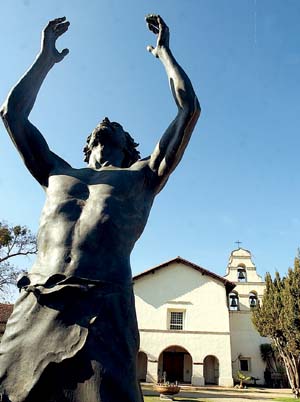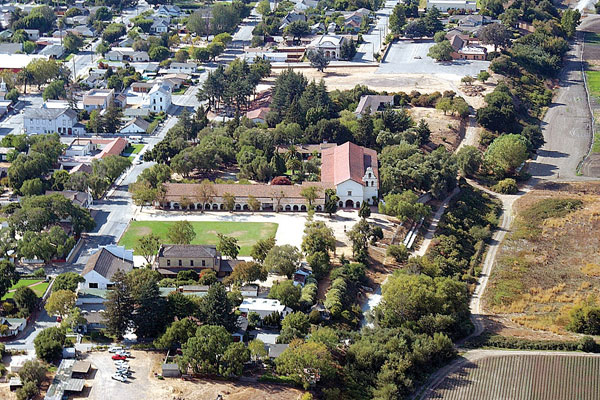A year and a half after it was introduced by U.S. Rep. Sam Farr,
D-Carmel, President George Bush has signed a bill that could bring
up to $20 million over the next five years to California missions,
including Mission San Juan Bautista.
San Juan Bautista – A year and a half after it was introduced by U.S. Rep. Sam Farr, D-Carmel, President George Bush has signed a bill that could bring up to $20 million over the next five years to California missions, including Mission San Juan Bautista.
The passage and signing of the bill Tuesday were viewed as a victory by Farr’s office and conservation advocates such as the California Missions Foundation, which will be the principal administrator of the money.
“It means a new start for us and is a catalyst that was not there before.” said Dr. Knox Mellon, executive director of the California Missions Foundation, a nonprofit organization that works to preserve the state’s missions.
The legislation makes missions eligible for funding from the Department of Interior, which usually does not allocate money to religious entities because of the constitutional separation between Church and State. Instead, California missions rely on gift shop proceeds, visitor fees and donations to raise money for conservation, which runs into the hundreds of millions of dollars at some missions, according to the California Missions Foundation.
“This victory is important no matter what your opinion is of the missions,” said Jessica Schaffer, spokeswoman for Farr’s office in Washington, D.C. “They are an important part of California history.”
Farr was traveling and not available for comment.
The bill provides $10 million in a matching grant, requiring the California Missions Foundation to come up with an equal share of any portion of the money before they can receive funds from the federal government.
San Juan Bautista is in dire need of repairs, especially to its foundation, because it is located on the San Andreas fault line. It also has drainage problems, which can lead to wall damage after rainfall.
“The money is not enough to address all the needs for the mission, but it will certainly help,” said Kevin Drabinski, spokesperson for the Monterey Diocese, which owns the San Juan mission and staffs it with priests. “Now that the money is available, missions can start having conversations about the needs they have.”
Criticism of the new legislation has not been far behind with advocacy group Americans United for Separation of Church and State saying they will file a suit in U.S. District Court for the District of Columbia to strike the new law down, according to the Associated Press.
“The act on its face advances religion in violation of the establishment clause of the First Amendment to the U.S. Constitution,” the suit reads.
Americans United for Separation of Church and State contend that protecting the separation between church and state should take a precedent over preservation as long as missions are owned by the Church.
“If they want to turn the missions over to the federal government, I say go ahead,” said Mary Goodman, a member of the Los Angeles chapter of Americans United for Separation of Church and State. “But why should our money go to something that is supporting just one religion?”
Church services are held at most California missions, including San Juan Bautista, but they are also visited by tourists, scholars and hoards of fourth graders studying California history. They are a boon to the California tourism industry, attracting some 5.5 million visitors a years, said Drabinski, of the Monterey diocese.
San Juan Bautista mission is one of seven California missions considered a national historic landmark, which allows it a higher level of protection.
“As far as I am concerned, the feds aren’t giving money to a church, they are giving it to a landmark,” said Mellon.
Although the federal government has had a strict hands-off policy in giving money to structures used as places of worship, it has eased off in recent years, said Mellon. Some examples include the Old North Church in Boston and the Touro Synagogue in Newport, R. I.
Farr’s bill was introduced in March 2003 and passed the House of Representatives in October. But it stalled in the Senate, just prior to the November election because, Republicans did not want to give U.S. Sen. Barbara Boxer, who supported the bill, an easy victory, said Schaffer.
Karina Ioffee covers education for the Free Lance. Reach her at (831)637-5566 ext. 335 or [email protected].








